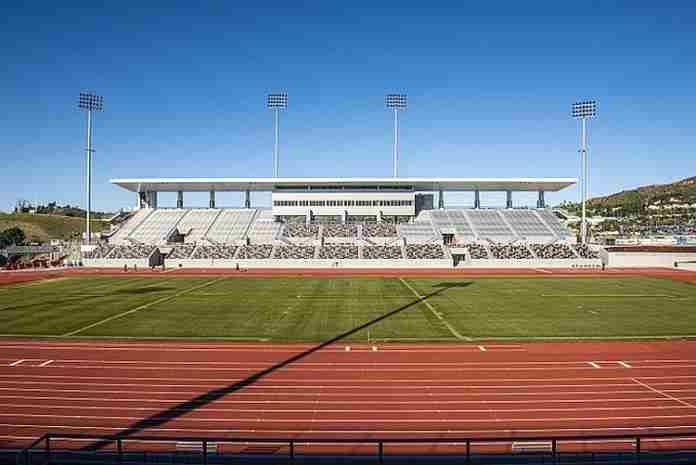We have reached critical mass in the worldwide sports response to the COVID-19 virus, with mass postponements – if not cancellations – of events, including dozens of Olympic qualifiers for the Games of the XXXII Olympiad in Tokyo.
While the spread of the virus continues to be quite modest in Japan, the inability to qualify may end up being a greater threat to holding the Games:
● According to the Johns Hopkins CSSE dashboard, there were 162,687 confirmed cases of coronavirus reported through Sunday (15th), but just 773 in Japan, with 117 declared recovered and 22 deaths. This compares to 12 European nations with more cases, plus China, South Korea, Iran and the U.S. The number of daily cases being reported is skyrocketing worldwide, even while the total inside Japan itself remains low.
Interestingly, Japan’s final qualifying event for the 20 km race walks was held as scheduled on Sunday in Nomi, with Koki Ikeda (1:18:22) and Nanako Fujii (1:33:20) winning and securing spots on the home team for Tokyo.
● The expansion of the virus and the attendant measures to control its spread in Europe and the U.S. especially has collapsed the international sports schedule just at the time when many of the Olympic sports are headed to the heaviest period for domestic competitions as we move into springtime.
● Perhaps the most aggressive of all the International Federations is the Federation Internationale de Soceties d’Aviron (FISA), which governs rowing. On Saturday, it posted a statement noting that “government actions to attempt to contain the transmission of the virus make it very difficult and unadvisable to stage international competitions during the months of March, April and through to May 2020.”
May? The FISA canceled all of its Olympic qualifying regattas through the middle of May, canceled the third World Cup (22-24 May) and added:
“FISA is now in close contact with the International Olympic Committee (IOC) and the International Paralympic Committee (IPC) in order to finalise proposals regarding the changes to the respective qualification systems. The next communication will take place on Tuesday, 17 March 2020.”
● Other federations have postponed or suspended competitions through the end of March (at least) and for many, into April. Many events are now re-slotted in June. The aquatics federation, FINA, has pushed off most of its events through the end of the month; the gymnastics folks (FIG) have pushed off most of its events through April, again into June. World Athletics still plans to hold its Diamond League opener in Doha (QAT) on 16-17 April, but many events held by others have been canceled or postponed.
● In the U.S., the collegiate sports season is about to collapse completely. The Pac-12 Conference has canceled all competitions through the end of the academic year and will make a determination by the end of the month concerning practices and other “organized team activities.” The Atlantic 10 Conference has shut down both competitions and practices until further notice and the Big 10 has done the same through 6 April. The Big XII has shut down athletic activities at all campuses through 29 March and the Southeastern Conference has done the same through 15 April.
The major college-based spring relay circuit has seen cancellations of the Florida Relays, Kansas Relays, Texas Relays and Mt. SAC Relays, although Mt. SAC might stage a one-day meet (without spectators) for the purpose of competing for Olympic Trials qualifying marks. Drake University stated that it is continuing to “closely monitor” the situation with the 24-27 April Drake Relays.
The University of Pennsylvania is “continuing to evaluate” the status of the Penn Relays (23-25 April), but the Jamaican government has instructed schools not to attend “this year because that travel and the location could involve levels of risks that we would like to discourage and we are putting an advisory out against that travel.”
So now the question about the staging of the Olympic Games in Tokyo is perhaps shifting from whether it can be held in Japan – where the coronavirus outbreak has been mild so far – to whether there will be:
(1) Appropriate and fair qualifying opportunities for athletes to get to the Games, and
(2) Whether there will be safe and sane travel options to get teams to already-arranged training camps ahead of the Games, and then to Tokyo itself.
If the spread of the virus continues for several more weeks in Europe, the cry for delay will reach a deafening level from athletes who either are prevented from competing due to travel restrictions in their own country, or in countries where events are taking place, or who do not wish to expose themselves to mass travel. It’s worth remembering that the fields in athletics and swimming are based on meeting qualifying standards, or an athlete’s place on the current world list.
Moreover, the training situation for many athletes is getting confused, and the ban on collegiate activities is already a problem for American athletes and for the many foreign athletes who are members of college teams.
Despite the calls from those who already hate the International Olympic Committee for other reasons to cancel or postpone the Games, the situation is not yet ripe for resolution. The Japanese are steadfast that the Games must go on. For the IOC, the situation in late April will be critical and the decision time will come then.
(The silliest comments have come from the haters who rip the IOC for not deciding what to do now, with the Games still four months away, and who praise as “leaders” the professional leagues like the NBA, NHL, Major League Baseball and the European football leagues, whose seasons are actually in operation! A double standard to be sure, but that never stopped stupidity before … nor will it in the future.)
In the midst of all of this, however, it’s worth noting that there are competitions ongoing in track & field, including an indoor throws meet in Beijing – of all places – where World Champion Lijiao Gong of China scored a win in the women’s shot with a world-leading 19.70 m (64-7 3/4) throw. The Chinese federation stated that meets scheduled for April are expected to be held. In Pretoria (RSA), star sprinter Akane Simbine ran a world-leading 9.91 in the heats of the 100 m at a regional championship meet, and won the final in 10.01. Very interesting.
¶
One of the events which has been canceled in the wake of the virus was the 4 April grand opening of the newly-renovated Hilmer Lodge Stadium at Mt. SAC in Walnut, California (pictured above), to be followed by the return of the Mt. SAC Relays on 16-18 April.
You may remember that after selecting the site for the 2020 Olympic Trials in June of 2017, USA Track & Field rescinded the appointment in May 2018, citing concerns that the facility would not be completed in time due to local lawsuits. Well, the stadium renovation is complete.
In the meantime, construction has been accelerated in Eugene to finish the new Hayward Field in time for the U.S. Trials in June. It was supposed to open for the Pac-12 Championships in mid-May, but that meet has been canceled and ticket sales for the Prefontaine Classic (6-7 June) have been stopped until the situation for that meet becomes clearer. The U.S. Olympic Trials for track & field are scheduled for 19-28 June.
If needed, Mt. SAC is ready … as it promised it would be.
Rich Perelman
Editor
You can receive our exclusive TSX Report by e-mail by clicking here. You can also refer a friend by clicking here.



























